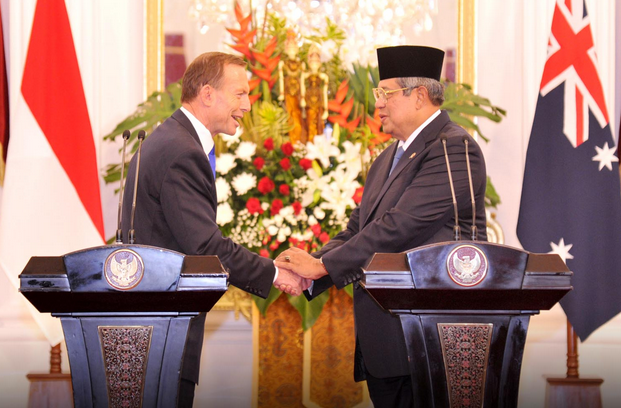Indonesia: blindspots and bullseyes
Posted By Peter Jennings on January 13, 2014 @ 06:00
One of the most curious cabinet papers released on 1 January this year was a submission on ‘Australia–Indonesia relations: prospects and approach’ [2] sponsored by the then Foreign Minister Bill Hayden and discussed in Cabinet on 6 October 1987. The paper set out a plan for rebuilding relations with Jakarta after a serious spat in 1986 when the journalist David Jenkins published a story [3] in the Sydney Morning Herald entitled, ‘After Marcos, now for the Suharto billions’ reporting in detail on the President’s hugely corrupt behaviour. Indonesia’s response was to expel Jenkins and other Australian journalists from the country and freeze political relations. The challenge for Bill Hayden was how to put the relationship back on track. An attachment to the Cabinet submission details the challenges, strengths and weaknesses in Canberra–Jakarta ties. It’s a strange mix of incisive observation mixed with stubborn blind spots.
Of course, the problems of 1987 resonate with the Abbott government’s current challenges with Indonesia. At some point Julie Bishop will have to submit a similar paper to Cabinet. But before that happens, there are some lessons to learn from the 1987 experience.
Hayden’s submission says Australia needs a ‘confident, business-like, non-inflammatory and well-coordinated approach’ to Jakarta. It should try to strengthen economic links, encourage a moderate Indonesian foreign policy, have closer Ministerial-level contact and accept that differences between the two countries will put limits on how close ties can grow. Hayden urges Cabinet to ‘avoid making so disproportionate an effort’ to improve relations that Jakarta concludes it’s Australia’s job ‘to make too many allowances for Indonesia.’ ‘Australia should avoid over-eagerness in our bilateral dealings’, the paper concludes. This pragmatic assessment fits very closely with the approach taken by Tony Abbott and Julie Bishop and the aftermath of media reporting about intelligence gathering. While Abbott’s cool-handed refusal to apologise was criticised both in Australia and Indonesia, it certainly followed Hayden’s view not to make Australia look like it was desperate for Indonesian forgiveness. Several months after the intelligence story broke [4], it appears Abbott’s approach was the right call.
Hayden’s slightly stand-offish strategy was based on a high degree of confidence that little could change politically in Indonesia. The Cabinet submission was very confident that Suharto would remain in power, potentially for another decade, and that any successor would be much like him: an oligarch backed by the military. ‘This prospect would appear to serve Australia’s regional interests well…’, the submission says. That judgement was both right and wrong. Suharto lasted until May 1998, but his departure after the Asian financial crisis also saw the collapse of the Indonesian political system and the rise of a democracy that had been altogether dismissed as a possibility by Hayden in 1987. In hindsight, it seems odd that an Australian government could find itself so comfortable in its support for, to use David Jenkins’s words [5], an ‘irredeemably corrupt’ kleptocrat and an individual who never hesitated to use violence to repress his own people. The Cabinet submission acknowledges that human rights violations would complicate the relationship, but only in so far as Australian NGOs would highlight them.
On East Timor, the Cabinet submission says only that international concern about Indonesia’s incorporation of the territory meant that Jakarta would ‘continue to accord priority to the development of the province. Considerable material, health and welfare benefits have accrued to the East Timorese.’ This was delusional, even in 1987.
On defence matters, the submission says little other than to (correctly) point out that the Indonesian military had very little capability to present a threat to Australia. But there are some very curious comments about nuclear capability. The submission points out that Indonesia was constructing a ‘sophisticated nuclear research facility.’ It then says:
Despite Indonesia’s accession to the NPT in 1979, the element of national prestige in Indonesia’s nuclear plans could lead in the longer term to an interest in the possible acquisition of nuclear weapons.
With what can only be a masterful understatement, the paper suggested that Australia should establish ‘a relationship with Indonesia in the nuclear area’, but it notes that an Indonesian nuclear capability ‘… could, however, become an emotional issue in Australia.’ Well, true dat! (But hardly an adequate response to what would be a fundamentally game-changing strategic development.)
PM&C endorsed the strategy in its coordination comments, ‘avoiding as it does the risks of unilateral aspiration by Australia to a special relationship’. Oddly, PM&C said that defence cooperation should be wound-down because it ‘does not serve identifiable Australian interests.’ Indonesian military capability still doesn’t present a threat to Australia but no current assessment could be as dismissive as the 1987 study about Indonesia’s future defence prospects or the value of Australian engagement with the TNI. It would have been helpful if PM&C’s advice to not get wistful about building a special relationship could have been regularly repeated in recent years. Both sides of Australian politics have built high expectations about the importance of ties and the need for Canberra and Jakarta to have a ‘strategic relationship’. The clear message of the 1987 cabinet submission, reinforced by recent experience, is that it may not be possible to achieve that aim. And if that’s true, as Bill Hayden said, it’s best not to look over-eager.
Peter Jennings is executive director of the Australian Strategic Policy Institute. Image courtesy of the official website of the President of the Republic of Indonesia [6].
Article printed from The Strategist: https://aspistrategist.ru
URL to article: /indonesia-blindspots-and-bullseyes/
URLs in this post:
[1] Image: https://aspistrategist.ru/wp-content/uploads/2014/01/abbott-sby.png
[2] submission on ‘Australia–Indonesia relations: prospects and approach’: http://recordsearch.naa.gov.au/SearchNRetrieve/Interface/DetailsReports/ItemDetail.aspx?Barcode=31429245
[3] David Jenkins published a story: http://parlinfo.aph.gov.au/parlInfo/search/display/display.w3p;db=CHAMBER;id=chamber%2Fhansards%2F1986-04-17%2F0201;query=Id%3A%22chamber%2Fhansards%2F1986-04-17%2F0170%22
[4] after the intelligence story broke: https://aspistrategist.ru/australia-indonesia-relations-steady-steady/
[5] to use David Jenkins’s words: http://www.smh.com.au/news/world/poor-man-rich-man-thief/2008/01/28/1201369039312.html?page=fullpage#contentSwap2
[6] official website of the President of the Republic of Indonesia: http://www.presidenri.go.id/index.php/galeri/album/2013/09/30/thumb/detail/3405/21682/
Click here to print.
